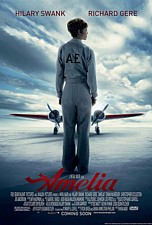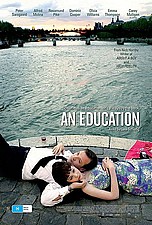
Knight at the Movies Archives
A feminist icon squeezed through the Hollywood star making machinery, a familiar but diverting indie
The endless fascination with aviatrix Amelia Earhart, the woman responsible for a lot of firsts in the air – and on the ground – who
tragically disappeared somewhere in the Pacific in 1937 is ongoing. She’s been the subject of countless books and television
specials and at least nine movies have been based on her story. Known as “Lady Lindy,” in part because of her physical
resemblance to Charles Lindbergh, Earhart has always held a particular place in the hearts of the queer community. Not just for her
feminist spirit and tireless support for women’s causes but also because rumors have swirled – as with other figures of her day – of a
hidden lesbian sexuality or perhaps, a bisexual one. Her close friendships with many other prominent lesbians, her open marriage
to publisher/entrepreneur George Putnam, and her refusal to conform to other rigid conventions of her day certainly point in that
direction.
All of which makes director Mira Nair’s new biopic, simply titled Amelia, all the more dispiriting. Working from a by the numbers
script by Ronald Bass and Anna Hamilton Phelan, Nair’s movie (executive produced by star Hilary Swank) reduces the story of this
feminine icon into a typical Hollywood romantic triangle, albeit one with some beautifully staged aerial set pieces (as always, Nair’s
striking color palette includes a lot of vivid shades of red). Instead of depth of character, however, we get a series of Earhart
triumphs – each cued by a title card and some vintage footage – a sort of postcards from the air highlighting Earhart’s greatest hits.
In between these sequences, Swank, a dead ringer for Earhart with the same toothy smile, looks snazzy in her 30s pants and aviator
jackets and speaks in a flat, no-nonsense twang, slightly reminiscent of Katharine Hepburn, enters into an uneasy relationship with
Richard Gere as Putnam. Gere, who looks great, plays another cynical, star maker (very much like Billy Flynn in Chicago) who pulls
the strings behind the scenes, manipulating the press and public into turning Earhart into a national celebrity. We see that Amelia is
uneasy with this and the constant pleas from George to make a commitment but what we don’t see is any real attraction between
Swank and Gere – or Swank and Ewan McGregor as the competitor for her affections either.
McGregor plays Gene Vidal (father of gay icon and author Gore who is played in the film as a child by William Cuddy), who worked
with Earhart on a number of projects and headed the government’s aeronautics division. As the affair with Gene takes off, everyone
acts very grown up and even little Gore asks Amelia matter of factly, “Why can’t you marry both?” But for reasons that aren’t entirely
clear, Amelia ends up back with Putnam for the duration and McGregor pretty much drops out of the movie.
In the final long sequence when Earhart and her navigator with a drinking problem are attempting to fly around the world (which also
acts as a larger framing device for the picture), Putnam is shown for about the third time in the film edgily sitting at a radio
transmitter tracking cool as a cucumber Amelia’s progress. The repetition dulls the impact of this final tragic flight in which Earhart’s
plane disappeared amidst controversy that continues to this day.
As for Earhart’s lesbian proclivities there are a few “daring” hints. In the midst of the affair with the McGregor character he spies her
admiring a lady’s legs and says, “You’re the only woman I know who points out other women” but this isn’t elaborated on. And a
sequence in which Amelia takes Eleanor Roosevelt (played by lesbian actor Cherry Jones) flying at night which calls to mind the
romantic night flying sequence between Kate Blanchett and Leonardo DiCaprio in The Aviator which cries out for elaboration fritters
away.
Sadly, we have not gotten much exhilaration or much of a real feeling for Earhart’s character beyond a series of platitudes spoken,
often in voice over, like “I want to be a vagabond of the air.” Swank, who registers best with audiences when she is victimized
emotionally or physically doesn’t offer much beyond her uncanny resemblance to Earhart and that dazzling smile. To be fair – a
“feel good” biopic isn’t nearly as interesting or compelling as one that portrays a life filled with slings, arrows, drug addiction,
character oddness, and lots of self deprecation. The forthright, optimistic Earhart as a subject has little in common with Edif Piaf, Ray
Charles, Howard Hughes, and Johnny Cash – all subjects of recent successful biopics that audiences have responded to.
Nair may have reckoned with this and opted instead for lensing what is a patently old fashioned Hollywood biopic (and Gabriel
Yared's sweeping music – as much a presence in the film as the stars are – certainly suggests this). This approach is not dissimilar
to 1943’s Flight for Freedom, a Rosalind Russell movie based on Earhart’s life or Kate Hepburn’s 1933 Christopher Strong). Taken on
those well worn but somewhat satisfying terms, Amelia will not disappoint too badly. Just don’t expect it to soar too high.
+++++++++++++++++++++++++++++++++++++++++++++++++++++++++++++++++++++++++++++++++++++++++++++
An Education, based on Lynn Barber’s memoir is one of those tried and true coming of age stories (this one set in suburban
London in 1961) in which a young lady is swept up by a Prince Charming who turns who to be, in the words of Sondheim, “Charming
but not sincere.” The movie is enlivened by the performance of newcomer Carey Mulligan in the leading role of Jenny whose heart is
captured and then recklessly broken by Peter Sarsgaard as David her sophisticated lover and a series of great supporting turns by
Alfred Molina as Jenny’s difficult father, Emma Thompson as a no-nonsense school headmistress, and heartthrob Dominic Cooper as
David’s wastrel best friend.
Jenny’s father, a mini tyrant, has drummed into her head that education is all and though she’s an excellent student she dreams of
the café society life. After a chance meeting with David, who instantly charms her, the 16 year-old Jenny lies on her bed listening to
the records of French chanteuse Juliette Grecco until dad pounds on the wall, “No French singing!” Jenny doesn’t know it (though we
do) but she’s about to exchange one oppressor for that of another kind – dad for a lover. Her dreams of living in Paris while
listening to Jacques Brel and smoking Gauloise cigarettes and escaping her humdrum life are about to come partially true.
David – with his fancy car, tailored suits and exquisite manners – quickly charms mum and dad and they agree to let young Jenny
date him. He introduces her to his best friend Danny (Cooper) and Danny’s girlfriend, a gorgeous blonde and takes Jenny to a posh
supper club where they dance to “I’m Comin’ Home Baby” by Mel Torme (one of the coolest songs ever). Jenny is swept away –
dazzled by the realization that this world she’s longed for is a matter of a point of view and a quick car ride away. But naturally,
heartbreak lies ahead.
There’s more than a hint of Jane Eyre, Rebecca and even bits of The Ghost & Mrs. Muir in the story of the sophisticated aesthete
dazzling the eager student of life longing for the unconventional, the risky, the fun. But though director Lone Scherfig gets great
performances from her cast the story, so compelling as it gets going, just sort of fritters away as it plays out. Also, Sarsgaard isn’t
quite the irresistible hottie that Cooper is (and the tantalizing prospect of an illicit romance within the illicit romance is kept at arms
length, too). As this winning growing up story faded off into a haze of emotional ennui – just as those Juliette Greco records do – I
thought as I always do when I see a movie like An Education about how much I want the gay movie doppelganger of this story. It’s
certainly a scenario very, very familiar to Our People.
tragically disappeared somewhere in the Pacific in 1937 is ongoing. She’s been the subject of countless books and television
specials and at least nine movies have been based on her story. Known as “Lady Lindy,” in part because of her physical
resemblance to Charles Lindbergh, Earhart has always held a particular place in the hearts of the queer community. Not just for her
feminist spirit and tireless support for women’s causes but also because rumors have swirled – as with other figures of her day – of a
hidden lesbian sexuality or perhaps, a bisexual one. Her close friendships with many other prominent lesbians, her open marriage
to publisher/entrepreneur George Putnam, and her refusal to conform to other rigid conventions of her day certainly point in that
direction.
All of which makes director Mira Nair’s new biopic, simply titled Amelia, all the more dispiriting. Working from a by the numbers
script by Ronald Bass and Anna Hamilton Phelan, Nair’s movie (executive produced by star Hilary Swank) reduces the story of this
feminine icon into a typical Hollywood romantic triangle, albeit one with some beautifully staged aerial set pieces (as always, Nair’s
striking color palette includes a lot of vivid shades of red). Instead of depth of character, however, we get a series of Earhart
triumphs – each cued by a title card and some vintage footage – a sort of postcards from the air highlighting Earhart’s greatest hits.
In between these sequences, Swank, a dead ringer for Earhart with the same toothy smile, looks snazzy in her 30s pants and aviator
jackets and speaks in a flat, no-nonsense twang, slightly reminiscent of Katharine Hepburn, enters into an uneasy relationship with
Richard Gere as Putnam. Gere, who looks great, plays another cynical, star maker (very much like Billy Flynn in Chicago) who pulls
the strings behind the scenes, manipulating the press and public into turning Earhart into a national celebrity. We see that Amelia is
uneasy with this and the constant pleas from George to make a commitment but what we don’t see is any real attraction between
Swank and Gere – or Swank and Ewan McGregor as the competitor for her affections either.
McGregor plays Gene Vidal (father of gay icon and author Gore who is played in the film as a child by William Cuddy), who worked
with Earhart on a number of projects and headed the government’s aeronautics division. As the affair with Gene takes off, everyone
acts very grown up and even little Gore asks Amelia matter of factly, “Why can’t you marry both?” But for reasons that aren’t entirely
clear, Amelia ends up back with Putnam for the duration and McGregor pretty much drops out of the movie.
In the final long sequence when Earhart and her navigator with a drinking problem are attempting to fly around the world (which also
acts as a larger framing device for the picture), Putnam is shown for about the third time in the film edgily sitting at a radio
transmitter tracking cool as a cucumber Amelia’s progress. The repetition dulls the impact of this final tragic flight in which Earhart’s
plane disappeared amidst controversy that continues to this day.
As for Earhart’s lesbian proclivities there are a few “daring” hints. In the midst of the affair with the McGregor character he spies her
admiring a lady’s legs and says, “You’re the only woman I know who points out other women” but this isn’t elaborated on. And a
sequence in which Amelia takes Eleanor Roosevelt (played by lesbian actor Cherry Jones) flying at night which calls to mind the
romantic night flying sequence between Kate Blanchett and Leonardo DiCaprio in The Aviator which cries out for elaboration fritters
away.
Sadly, we have not gotten much exhilaration or much of a real feeling for Earhart’s character beyond a series of platitudes spoken,
often in voice over, like “I want to be a vagabond of the air.” Swank, who registers best with audiences when she is victimized
emotionally or physically doesn’t offer much beyond her uncanny resemblance to Earhart and that dazzling smile. To be fair – a
“feel good” biopic isn’t nearly as interesting or compelling as one that portrays a life filled with slings, arrows, drug addiction,
character oddness, and lots of self deprecation. The forthright, optimistic Earhart as a subject has little in common with Edif Piaf, Ray
Charles, Howard Hughes, and Johnny Cash – all subjects of recent successful biopics that audiences have responded to.
Nair may have reckoned with this and opted instead for lensing what is a patently old fashioned Hollywood biopic (and Gabriel
Yared's sweeping music – as much a presence in the film as the stars are – certainly suggests this). This approach is not dissimilar
to 1943’s Flight for Freedom, a Rosalind Russell movie based on Earhart’s life or Kate Hepburn’s 1933 Christopher Strong). Taken on
those well worn but somewhat satisfying terms, Amelia will not disappoint too badly. Just don’t expect it to soar too high.
+++++++++++++++++++++++++++++++++++++++++++++++++++++++++++++++++++++++++++++++++++++++++++++
An Education, based on Lynn Barber’s memoir is one of those tried and true coming of age stories (this one set in suburban
London in 1961) in which a young lady is swept up by a Prince Charming who turns who to be, in the words of Sondheim, “Charming
but not sincere.” The movie is enlivened by the performance of newcomer Carey Mulligan in the leading role of Jenny whose heart is
captured and then recklessly broken by Peter Sarsgaard as David her sophisticated lover and a series of great supporting turns by
Alfred Molina as Jenny’s difficult father, Emma Thompson as a no-nonsense school headmistress, and heartthrob Dominic Cooper as
David’s wastrel best friend.
Jenny’s father, a mini tyrant, has drummed into her head that education is all and though she’s an excellent student she dreams of
the café society life. After a chance meeting with David, who instantly charms her, the 16 year-old Jenny lies on her bed listening to
the records of French chanteuse Juliette Grecco until dad pounds on the wall, “No French singing!” Jenny doesn’t know it (though we
do) but she’s about to exchange one oppressor for that of another kind – dad for a lover. Her dreams of living in Paris while
listening to Jacques Brel and smoking Gauloise cigarettes and escaping her humdrum life are about to come partially true.
David – with his fancy car, tailored suits and exquisite manners – quickly charms mum and dad and they agree to let young Jenny
date him. He introduces her to his best friend Danny (Cooper) and Danny’s girlfriend, a gorgeous blonde and takes Jenny to a posh
supper club where they dance to “I’m Comin’ Home Baby” by Mel Torme (one of the coolest songs ever). Jenny is swept away –
dazzled by the realization that this world she’s longed for is a matter of a point of view and a quick car ride away. But naturally,
heartbreak lies ahead.
There’s more than a hint of Jane Eyre, Rebecca and even bits of The Ghost & Mrs. Muir in the story of the sophisticated aesthete
dazzling the eager student of life longing for the unconventional, the risky, the fun. But though director Lone Scherfig gets great
performances from her cast the story, so compelling as it gets going, just sort of fritters away as it plays out. Also, Sarsgaard isn’t
quite the irresistible hottie that Cooper is (and the tantalizing prospect of an illicit romance within the illicit romance is kept at arms
length, too). As this winning growing up story faded off into a haze of emotional ennui – just as those Juliette Greco records do – I
thought as I always do when I see a movie like An Education about how much I want the gay movie doppelganger of this story. It’s
certainly a scenario very, very familiar to Our People.
The Higher You Fly, The Farther You Fall:
Amelia-An Education
Expanded Edition of 10-21-09 Windy City Times KATM Column*
By Richard Knight, Jr.
Amelia-An Education
Expanded Edition of 10-21-09 Windy City Times KATM Column*
By Richard Knight, Jr.
CHECK OUT OTHER KATM FILM REVIEWS IN THE ARCHIVES
*Amelia screened after my WCT deadline but in time for me to include my review here


